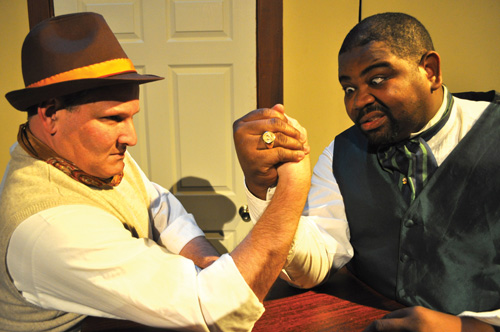THEATER Linda Brown is a maid at the end of her tether, and tender, as the much-put-upon employee-slave of an exclusive country club. The signs are there from the moment she steps onto the stage: the circles under the young woman’s eyes, her frightened stare, the desperate swigs from a ready flask, not to mention her shameless histrionic intensity as she addresses the audience about the soul-sucking richies perpetually at her back.
But it will take the full length of playwright-director Jeff Bedillion and Back Alley Theater’s sometimes ambling, generally rowdy new farce, Country Club Catastrophe, before our lower-class heroine manages a proper escape — only it’s unclear even to her if it’s a genuine escape at all, as she stares into the eyes of her replacement with an eerie shock of recognition.
In this uneven but promising production by newcomers Back Alley Theater, performances are at times stilted and pacing might be tightened in places, and perhaps as much as 20 minutes of meandering dialogue productively lost from the second half. But Country Club Catastrophe gets laughs in part because it knows what it is about. Inspired equally by classical French farce — Molière’s five-act structure in particular — and recognizably American figures from the yawning class divide, it aims at a contemporary social crisis churned by the obscene disparities in wealth in post–middle-class America. (All glimpsed at the preview ahead of opening night.)
Thus, long before her existentially fraught exit, both Linda (played by a comically intense yet sympathetic Katharine Otis) and her handsome gold-digging coworker, the doorman Max (a winningly boisterous Joshua Rice), largely retreat from view behind an onslaught of self-absorbed club members (numbering only a handful in fact, and yet a real handful just the same).
First to arrive is Mrs. Montgomery (a sharp, coolly imperious Jennifer Lucas), her teased hair rising to just within the frame of the front door center stage (in A.J. Diggins’ spare, functional set design) and a long leash trailing from her wrist to an unseen standard poodle with an unhealthy appetite for the doorman. (Exit Max for some scenes.)
Separately from Mrs. Montgomery — who in a manipulative confessional gesture lets Linda know her first name is Tabytha, only to insist she still call her Mrs. Montgomery — arrives the rest of her small but attenuated family. There is husband Miles (Len Shaffer, dispensing affable sleaze), a jolly and salacious philanderer; and son Tristan (a humorously shrill Salvadore Mattos), Tabytha’s barely closeted Brown University brat whose constant companion is a houseplant he calls Sister.
Greater than Tristan’s fixation on foliage, however, is his unbounded lust for childhood playmate Edward (Jeremy Bardwell), the egomaniacally cocksure but increasingly put out fortunate son of club members Biff and Muffy Birmingham (played, respectively, by a buoyantly silly John Weber and a hilariously sugary yet menacingly bitchy Meaghan M. Mitchell). Biff and Miles are best friends; Muffy and Tabytha not so much. Muffy prefers the company of club member and shy post-debutante Peggy Dupont (a harried Sabrina De Mio), whom Muffy bosses and harshly abuses with an almost innocent glee.
Last and, in the opinion of the club house anyway, certainly least comes Cynthia Anniston (an amusingly oblivious and high-keyed Gloria Terese McDonald), Brown University first-year and cheerleader desperately chasing one-night-stand Edward, her lax outfit reading alternately “prostitute” and “foreign exchange student” to the club’s members and its equally indignant staff.
For the play finds stark but amusing ways to underscore the primacy of money over every other social divide, be it race or sexual orientation or education. Even the mere appearance of not having money is enough to put one squarely outside the club — or rather, squarely within its steep hierarchies of privilege and worth. As the plot gets increasingly tangled, we’re left to consider the intoxicating stench of money in everyone’s noses as the ultimate obscenity.
And yet, Linda (and the play) asks, can the greed, selfishness, backstabbing, dirty dealing, and rampant mistreatment that runs rife through these perverse excuses for families really continue without some final judgment befalling such a club and such a country?
Intonations of just such a judgment are there already in the title, in a gathering electric storm outside, in the self-consciously heightened language, and in the rumblings of piano keys from musician Mike Miraglia’s offstage upright. But the catastrophe that finally breaks in on this world isn’t exactly The Day of the Locust. It is, instead, an ironic and apt judgment on the misspent lives and deflated hopes of the present day, so semi-cozy and quietly desperate despite the raging storm outside. 2
COUNTRY CLUB CATASTROPHE
Through Aug. 13
Thurs.—Sat., 8 p.m., $20
Exit Theatre
156 Eddy, SF

